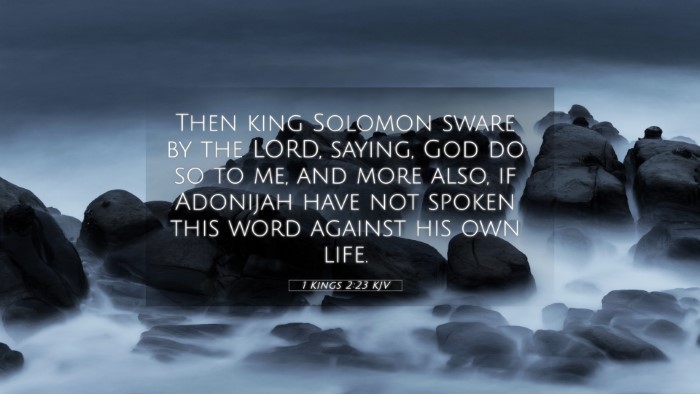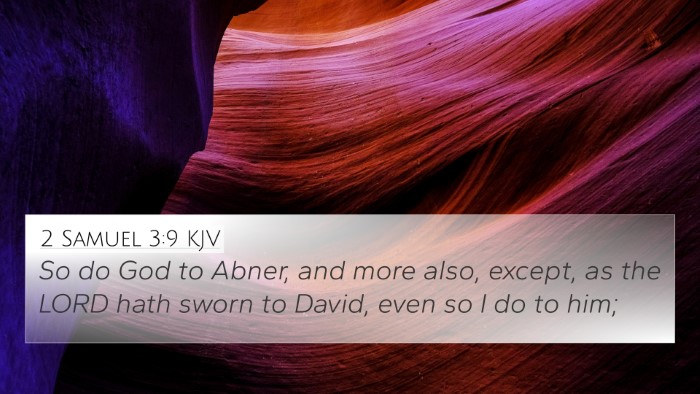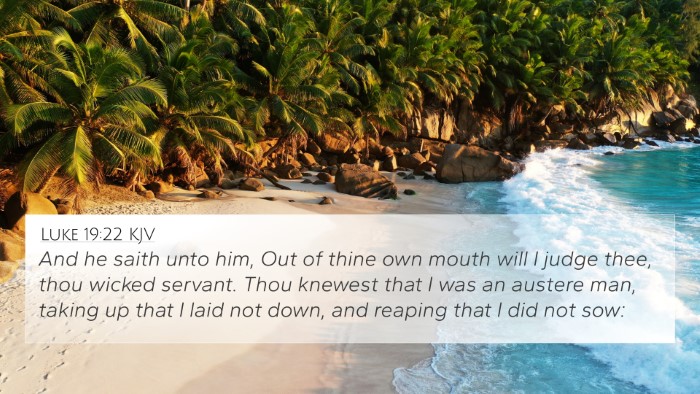Understanding 1 Kings 2:23
Verse: 1 Kings 2:23 - "Then King Solomon swore by the LORD, saying, 'May God do so to me and more also, if Adonijah has not spoken this word against his own life!'"
Summary of Meaning
This verse occurs during a pivotal moment in the narrative of King Solomon's ascension to the throne. Adonijah, who had previously declared himself king, seeks favor with Solomon through a request that highlights his political maneuvering. Solomon's response is significant as it reveals both his authority as king and his commitment to justice against any rival threats to his reign.
Commentary Insights
-
Matthew Henry:
Henry emphasizes the gravity of Solomon's oath. He notes that Solomon is establishing a clear stance against any treason, indicating that Adonijah’s plea is insidious and could threaten Solomon’s rule. The oath signifies a solemn declaration that highlights the seriousness of political loyalty and the repercussions of betrayal.
-
Albert Barnes:
Barnes observes the significance of Solomon's swearing by the Lord. This act not only invokes divine witness but also solidifies Solomon’s claim to the throne, showcasing his reliance on God for guidance and justice. It implies that the stakes are spiritually and politically high, as Solomon aligns his actions with divine will.
-
Adam Clarke:
Clarke elaborates on the implications of Adonijah's actions as a traitor, suggesting that the request for mercy was a clever act of self-preservation. Solomon's response reflects his wisdom in dealing with potential threats while demonstrating his commitment to uphold righteousness in his kingdom.
Cross-References and Biblical Connections
1 Kings 2:23 can be cross-referenced with the following verses to draw deeper insights into the themes of loyalty, kingship, and divine justice:
- 1 Kings 1:5-6: Adonijah’s self-proclamation as king.
- 1 Kings 2:12: Solomon’s rise to power and righteousness as king.
- 1 Samuel 15:23: The seriousness of rebellion and its consequences.
- Psalm 2:10-12: The call to submit to the Lord’s anointed, a thematic parallel to Solomon’s kingship.
- Proverbs 20:25: The implications of making hasty vows.
- Matthew 5:33-37: The teaching on oaths and integrity.
- Romans 13:1: The principle of being subject to governing authorities.
Tools for Bible Cross-Referencing
To further explore the connections between Bible verses, consider using resources such as a Bible concordance, which helps identify key terms and their appearances throughout Scripture. Additionally, utilizing a Bible cross-reference guide can enhance your study, revealing themes and parallels amongst different biblical texts.
How to Use Bible Cross-References
Finding cross-references in the Bible can deepen your understanding. Here are some methods:
- Look for thematic connections within verses.
- Use a cross-reference Bible study to identify linked passages.
- Explore chain references that allow for comparative analysis among scripts.
Further Insights
This verse encourages an exploration into:
- The role of kingship in the Old Testament
- Examples of faithfulness and treachery
- The expectation of divine support for rulers
By understanding passages like 1 Kings 2:23 in the context of its cross-referenced verses, you can appreciate the broader narrative of divine justice and sovereignty in Scripture, and how these themes resonate throughout both the Old and New Testaments.














